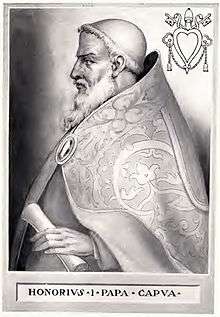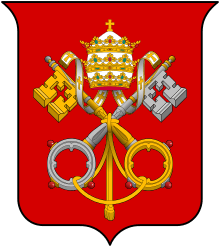Pope Honorius I
| Pope Honorius I | |
|---|---|
 | |
| Papacy began | 27 October 625 |
| Papacy ended | 12 October 638 |
| Predecessor | Boniface V |
| Successor | Severinus |
| Personal details | |
| Born | Campania, Byzantine Empire |
| Died | 12 October 638 |
| Other popes named Honorius | |
Pope Honorius I (died 12 October 638) reigned from 27 October 625 to his death in 638.[1]
Honorius, according to the Liber Pontificalis, came from Campania and was the son of the consul Petronius. He became pope two days after the death of his predecessor, Boniface V. The festival of the Elevation of the Cross is said to have been instituted during the pontificate of Honorius, which was marked also by considerable missionary enterprise. Much of this was centered on England, especially Wessex. He also succeeded in bringing the Irish Easter celebrations in line with the rest of the Catholic Church.
Although Honorius never issued a dogmatic (ex cathedra) decree in regard to the controversy of Christ's wills,[1] he favoured Monothelitism. He supported a formula proposed by the Byzantine Emperor Heraclius with the design of bringing about a reconciliation between Monothelites and the rest of the Catholic Church. Monothelitism is the teaching that Christ has only one will, the divine will, in contrast with the teaching that He has both a divine will and a human will. To this end, Honorius "sent his deacon Gaios" to a synod in Cyprus in 634 hosted by Archbishop Arkadios II with additional representatives from Patriarch Sergius I of Constantinople. The anti-Monothelite side in Jerusalem, championed by Maximus the Confessor and Sophronius of Jerusalem, sent to this synod Anastasius (a pupil of Maximus), George of Reshaina (a pupil of Sophronius), two of George of Raishana's own pupils, and eight bishops from Palestine. When the two sides were presented to the Emperor, the Emperor persisted with Monothelitism and so did Honorius. (George of Reshaina, "An Early Life of Maximus the Confessor", 316–7)
He was apparently aware of the rise of Islam[2] and viewed this new religion's tenets closely resembling those of Arius.[3]
Anathematization
More than forty years after his death, Honorius was anathematized by name along with the Monothelites by the Third Council of Constantinople (First Trullan) in 680. The anathema read, after mentioning the chief Monothelites, "and with them Honorius, who was Prelate of Rome, as having followed them in all things".
Furthermore, the Acts of the Thirteenth Session of the Council state, "And with these we define that there shall be expelled from the holy Church of God and anathematized Honorius who was some time Pope of Old Rome, because of what we found written by him to [Patriarch] Sergius, that in all respects he followed his view and confirmed his impious doctrines." The Sixteenth Session adds: "To Theodore of Pharan, the heretic, anathema! To Sergius, the heretic, anathema! To Cyrus, the heretic, anathema! To Honorius, the heretic, anathema! To Pyrrhus, the heretic, anathema!"
This condemnation was subsequently confirmed by Leo II (a fact disputed by such persons as Cesare Baronio and Bellarmine,[4] but which has since become commonly accepted) in the form, "and also Honorius, who did not attempt to sanctify this Apostolic Church with the teaching of Apostolic tradition, but by profane treachery permitted its purity to be polluted". The New Catholic Encyclopedia notes: "It is in this sense of guilty negligence that the papacy ratified the condemnation of Honorius." That is, the papacy condemned Honorius not for teaching a heresy ex cathedra, but for negligently permitting heretical positions to stand alongside orthodox ones.
This anathema against Honorius was later one of the main arguments against Papal infallibility in the discussions surrounding the First Vatican Council of 1870, where the episode was not ultimately regarded as contrary to the proposed dogma. This was because Honorius was not considered by the supporters of infallibility to be speaking ex cathedra in the letters in question (although the Catholic historian Hefele and opponents of the definition believed that Honorius had spoken ex cathedra),[1] and he was alleged to have never been condemned as a Monothelite, nor, asserted the proponents of infallibility, was he condemned for teaching heresy, but rather for gross negligence and a lax leadership at a time when his letters and guidance were in a position to quash the heresy at its roots.
Historian Jaroslav Pelikan notes: "It is evident, as Maximus noted in exoneration of Honorius, that his opposition to the idea of 'two wills' was based on the interpretation of 'two wills' as 'two contrary wills.' He did not mean that Christ was an incomplete human being, devoid of a human will, but that as a human being he did not have any action in his body nor any will in his soul that could be contrary to the action and will of God, that is, to the action and will of his own divine nature."[5]
References
- 1 2 3
 Chapman, John (1910). "Pope Honorius I". In Herbermann, Charles. Catholic Encyclopedia. 7. New York: Robert Appleton Company.
Chapman, John (1910). "Pope Honorius I". In Herbermann, Charles. Catholic Encyclopedia. 7. New York: Robert Appleton Company. - ↑ Muhammad Ata Ur-Rahim; Ahmad Thomson (2003). Jesus: Prophet of Islam. TTQ, INC. p. 148. ISBN 9781879402737.
- ↑ Ata Ur-Rahim, Thomson 2003, p. 148., quote: "Pope Honorius was aware of the rising tide of Islam, whose tenets very much resembled those of Arius. The mutual killing of Christians by each other was still fresh in his memory, and perhaps he thought that what he had heard about Islam might be applied in healing the differences between the various Christian sects. In his letters he began to support the doctrine of 'one mind' within the doctrine of Trinity. He argued that if God had three independent minds, the result would be chaos. This logical and reasonable conclusion pointed to the belief in the existence of One God."
- ↑ Perlant, M. Jean-Andre (June 1994). "The Sullied Reputation of a Holy Pope". The Francinta Messenger.
- ↑ Pelikan, Jaroslav. "The Spirit of Eastern Christendom (600-1700)". The Christian Tradition. 2. University of Chicago Press. p. 151. ISBN 0-226-65373-0.
Bibliography
- Meyendorff, John (1989). Imperial unity and Christian divisions: The Church 450-680 A.D. The Church in history. 2. Crestwood, NY: St. Vladimir's Seminary Press. ISBN 978-0-88-141056-3.
External links
| Wikisource has the text of the 1913 Catholic Encyclopedia article Pope Honorius I. |
- Guilty Only of Failure To Teach
- History of the Christian Church, Volume IV: Mediaeval Christianity. A.D. 590–1073, Philip Schaff
| Catholic Church titles | ||
|---|---|---|
| Preceded by Boniface V |
Pope 625–638 |
Succeeded by Severinus |
Original text taken from a paper copy of the 9th edition Encyclopædia Britannica (1881) and the Catholic Encyclopedia

